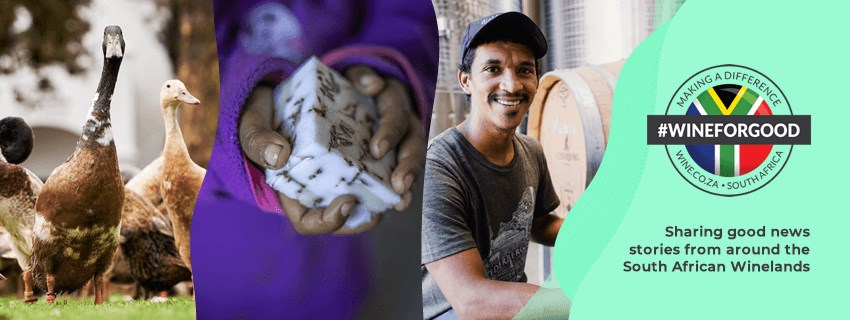With a dedicated invasive alien plant control management plan, Delheim Wines – along with the Delheim Hackers, a group of biodiversity conservation volunteers – have taken a proactive stance in combatting the harm caused by invasive alien species to the environment, the economy and even to human health. You can join Delheim to make a tangible difference in protecting our precious biodiversity and water resources.
Nestled on the slopes of the Simonsberg Mountains in the heart of the Cape Floral Kingdom in Stellenbosch, South Africa, the soils of Delheim Wine Estate support the endangered Boland Granite Fynbos, along with a further 125 different species of indigenous plants and a variety of trees and shrubs, many near-threatened, vulnerable or endangered. It encompasses 150ha of beautiful fynbos species, including a number of proteas and Ericas, and endemic wildlife such as the Cape Sugarbird that is found nowhere else on earth.
It is paramount to protect the rich biodiversity on Delheim’s pristine landscapes which, like other many ecosystems worldwide, are under threat from invasive alien plants that threaten this unique biodiversity.
Impact of invasive alien plants
Invasive alien plants (IAPs) have a profound impact on the environment, the economy and even human well-being.These plants multiply quickly and spread rapidly because they have no natural controls, outcompeting indigenous species, disrupting natural balances and disturbing ecosystems. They consume significant amounts of water and contribute to water scarcity by invading riverbanks, blocking water channels and reducing stream flow, so less water reaches the dams. Their presence increases wildfire risks and result in hotter and more intense fires. These plants – including black and golden wattle, blue gum and pine trees – drive biodiversity decline and pose dangers to lives, livelihoods and the environment.

Delheim’s conservation efforts
Delheim’s work to conserve its important natural habitats and critical biodiversity areas includes the regular clearing and removal of invasive alien vegetation. Delheim embarked on restoring areas previously occupied by pine trees, which were destroyed by a fire in 2016, and made the decision to revert the veld back to its original fynbos, mirroring the successful restoration efforts undertaken on other parts of the farm.
Delheim has implemented a comprehensive invasive alien plant control management plan, targeting priority areas such as forests, fynbos areas, wetlands, dam walls and water catchment areas like the Klippies River and Delvera Dam to ensure the free flow of water.
Delheim employs two full-time staff members dedicated to alien plant control and utilises mulched tree clippings for soil enrichment.
These ongoing efforts have yielded promising results, including enhanced soil health and the return of indigenous vegetation such as the Simonsberg Bietou (osteospermum hispidum viridum), a plant species endemic to the Simonsberg.
These achievements highlight the importance of collaborative conservation initiatives in safeguarding the unique biodiversity of the Cape Floral Kingdom.
Introducing the Delheim Hackers
To boost collaborative conservation efforts and include the community, Delheim initiated the Delheim Hackers, a volunteer group committed to eradicating invasive alien plants, in August 2020, during COVID. Meeting every second Saturday of the month at sunrise for around three hours in the veld, the volunteers undertake hands-on removal of lighter infestations, seedlings and single plants through hand pulling, cutting, digging out, ring barking or bark stripping using loppers and handsaws, contributing immensely to the restoration of natural ecosystems, protecting water resources and conserving biodiversity.

The Department of Environmental Affairs’ Working for Water Programme and the Department of Agriculture’s Land Care Programme have provided regular assistance to the property over the years, offering co-funding for invasive alien plant control operations and herbicide assistance, particularly for black wattle, golden wattle, hakea, and pine trees. The Delheim volunteers assist with the regular maintenance of these sites, and the Simonsberg Conservancy provides assistance with donated equipment.
"The Delheim Hackers initiative is a testament to our commitment to environmental stewardship and community engagement," says Nora Thiel, co-owner at Delheim. "We have cleared substantial areas of invasive alien vegetation over the last four years, and continuously maintain these areas. We have seen the veld recover to its original state! Together, we’re making a tangible difference in protecting our biodiversity and water resources."
Join the Delheim Hackers
Delheim invites individuals passionate about environmental and biodiversity conservation to join the Delheim Hackers in their mission to combat invasive alien plants and preserve South Africa’s natural heritage. Anyone is welcome to join on an ad hoc basis, and the coffee and muffins are our treat. Together, we can ensure a sustainable future for generations to come!
For more information about Delheim’s conservation initiatives or to join the Delheim Hackers, please contact hospitality@delheim.com.

There are plenty of good news stories from the South African Winelands. The #wineforgood campaign, launched by wine.co.za in June 2016, is all about sharing these positive and uplifting stories. We dedicate the month of April to our #wineforgood campaign each year, sharing a good news story every day. Join us in spreading the good news about South African wine. If you'd like to submit a story, please email editor@wine.co.za.